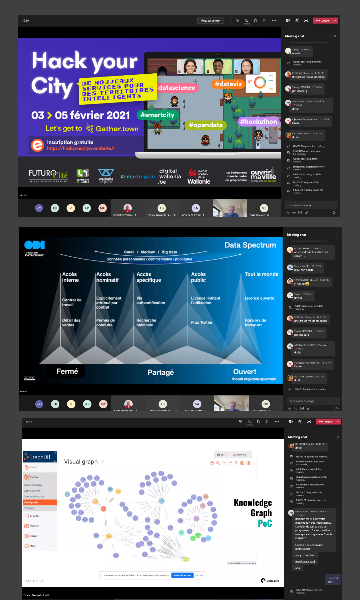The third and final smart city inspiration session closed last Monday, having attracted a large number of participants.
Nicolas Installé, Executive Director of the FuturoCité Innovation Centre, opened the session with a conceptual introduction to open data, entitled "The added value of data at the territorial level". FuturoCité is known among open data aficionados for successfully offering several training sessions on open data for Walloon local administrations in 2019.
Several important messages caught the attention of those present:
- the advantage of open data is in allowing the data reuse by researchers, citizens and companies, but above all by the administrations themselves, between different entities and sometimes between colleagues from different departments!
- the main motivations for open data are transparency, as demonstrated by the Easy Brussels subsidy register project, a move away from the partisan interests of large companies like Google Maps (such as representing all the attributes of a territory, not just businesses), the development of new services on the territory, improved decision-making by elected representatives and exchanges between public administrations.
FuturoCité has stepped up its offer to municipalities and is organising a complete training and support programme built around the use of open data. Seventeen municipalities are involved in selecting data uses according to three themes (mobility, resilience and citizen participation). Depending on these specific uses, the necessary data is identified and the opening process initiated. The programme will end at the beginning of February 2021 with a major hackathon, during which computer science students will perform these uses on the basis of the newly open data. (
https://www.futurocite.be/hack-your-city/)
Thomas Grivegnée, project manager at Cognizone, then shared his vision of open data and presented a project of interest to the European Parliament. Cognizone is a Brussels SME, a partner of easy.brussels in producing the subsidy register in the Brussels-Capital Region. Hannelore Cuchet (easy.brussels) attended to present this register, which will include all the subsidies granted by the Brussels administrations and offer scorecards that can be understood and easily interpreted by the citizens of Brussels. This is a wonderful democratic transparency project, but also a way of simplifying and better organising the aggregation of information between public entities.
Finally, Filis Zumbultas, Smart City Coordinator for the City of Brussels, presented the open data strategy. We were able to browse live on the city's open data site, observe the data views on maps, the integration of these maps on the official website and the performance indicators used to measure the progress made in open data. (
https://opendata.brussels.be/page/home/)
This open data platform is a great success, with more than one million API (Application Programming Interface - small pieces of software that make data available) requests per month. A project for the automatic collection of 15 data sets is planned in 2021. Deliberations are also planned on the follow-up of customers, who currently use the site anonymously, as the current situation does not allow for a detailed analysis of data reuse.
Interesting detail: the City itself benefits from numerous data reuses (for the integrated map on its website for example).
Contact the
BRIC for more information on open data policy and tools in the Brussels Region!
